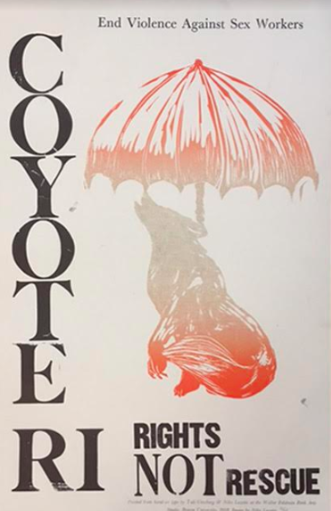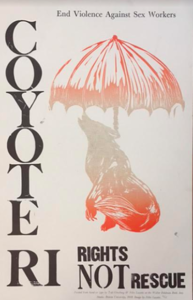International Day to End Violence Against Sex Workers- 10 Years of Organizing Under Criminalization
In 2003, renowned sexologist, educator, and former sex worker Annie Sprinkle organized the first “International Day To End Violence Against Sex Workers.” Today we mourn for the 48 sex workers who were lost to violence in 2019 and we renew our commitments to the on-going struggle for empowerment, visibility, and rights for all sex workers.
As we remember this violence taking place this year, we remember where this started. For over a period of more than 15 years, from 1982 through 1998, a total of 49 girls and women disappeared in King County, Washington and were later found dead. The media dubbed the unknown perpetrator as the Green River Killer because some of the victims were found in or near that river. In November of 2003, Gary Leon Ridgeway pleaded guilty to 48 counts of murder and related charges and on December 17, 2003, he was sentenced to 48 life terms in prison plus 480 additional years. More than a decade later, however, the final record of the Ridgeway’s horrors are still hazy and likely incomplete. In one prison interview, he claimed to have killed 71 women, while some estimate the total to be 90 or more. Many of Ridgeway’s victims were sex workers and others marginalized by society, such as runaways. In fact, the primary reason Ridgeway was spared the death penalty as part of his plea agreement was to allow him an opportunity to account for the fate of his victims. The first December 17 memorial observance was held the very day that Ridgeway was sentenced for his crimes.
We also remember the violence of Samuel Little; Little says he strangled his 93 victims between 1970 and 2005. Little confessed to 93 murders, and FBI crime analysts believe all of his confessions are credible. Law enforcement has been able to verify 50 confessions, with many more pending final confirmation. Most of his victims were women of color, sex workers, hitchhikers, and more individuals from marginalized communities. Yet, due to the police’s lack of interest, many of his victims’ deaths were originally ruled overdoses or attributed to accidental or undetermined causes. Some bodies were never found. For many years, Little believed he would not be caught because he thought no one was accounting for his victims.
We also remember Mary Grier. On July 15th, 2012 20-year-old, Grier, an online escort, booked an appointment and went to a man’s home in Cranston, RI where she was beaten to death.
We also remember Ashley Masi. On March 31st, 2015, 24-year old Masi, a young mother who struggled to support her three young daughters, was strangled with a zip tie and murdered in her third-floor apartment in Elmhurst, RI. Channel 10 news and, Providence Journal both harassed her mother asking, “If she knew that her daughter was an online escort?” As if that would somehow justify her murder.
We also remember how we have no protection and no service. We do not feel safe calling the police for fear of arrest, intimidation or violence, so what’s the alternative if one has been burgled, robbed or assaulted?
We also remember the police’s silence around Khanlil Wheeler Weaver’s violence in 2019. Weaver is accused of murdering three women and attempting to kill a fourth. He targeted young black women who did sex work because he figured no one would notice if they disappeared. His attorney contends that his victims were at fault because they were whores and because he doesn’t look like someone who would’ve done something like this. Despite Weaver handcuffing his fourth victim, covering her mouth with duct tape, raping her, and almost strangling her to death, she convinced Weaver to take her back to the motel, where she had left her cellphone. At the hotel, she locked him out of the room while she dialed 911. But, the cops who responded to the call were more interested in figuring out if she was a prostitute; months would pass before Weaver was arrested. Meanwhile, as the cops targeted sex workers, Weaver murdered another woman – Sarah Bulter – whose family did call the police when she did not come home. As the cops ignored the issue, Butler’s parents, sisters, and friends took matters into their own hands. Using Sarah’s social media to gather information, created a fake social media profile to lure Weaver into a trap. After he was finally arrested, the cops found that Weaver had a slew of disturbing online searches, including “How to make homemade poisons to kill humans,” and “what chemical could you put on a rag and hold to someone’s face to make them go to sleep immediately.” While the cop ignored those fighting for justice, Weaver had been working as a grocery store security guard, hoping to become a cop, no doubt so he could continue his violence and rape and murder women with impunity.
We also remember that rather than creating policies that would allow sex workers to report violence without fear of arrest, Providence Public Safety Commissioner Steven Pare and police announced more than 30 arrests “targeting human traffickers, specifically those victimizing juveniles.” However, the RI ACLU called them out in a press release, stating that “Conflating prostitution with trafficking does nothing to help the trafficking victims who remain ensnared while consenting adults are pursued and arrested. By humiliating and charging clients, for seeking consensual sex and by giving sex workers arrest records in the name of ‘helping’ them, these operations misleadingly purport to crack down on human trafficking, when their major effect is just to make the lives of sex workers more difficult and dangerous.”
As we approach Dec 17th, we come together to publicly honor Sex Workers that we have lost to violence. We renew our commitments to the on-going struggle for empowerment, visibility, and rights for all sex workers. We also renew our commitment to solidarity. The majority of violence against sex workers is not just violence against sex workers – it is also simultaneously violence against transgender women and people, against women of color, against drug users, against the undocumented and migrants, and against the homeless. We cannot end the marginalization and victimization of all sex workers without also fighting rampant transphobia, racism, stigma, the criminalization of drug users, and xenophobia. Because, work includes sex work, and we remember. ###
Please join us on Tuesday, December 17th, 2019 from 6 pm- 8 pm, @ PrYsm, 669 Elmwood Ave, Suite B13, Providence RI 02907. Free Community Event – Refreshments will be served. Contact: Bella Robinson 401-525-8757- bella@ozmweb.com
December 17th, 2019- Memorial Video

